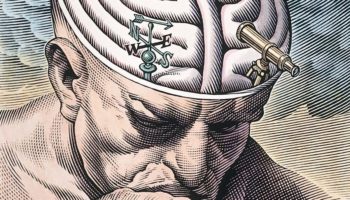In the past years, Europe has suddenly become entangled in a fight for maintaining international order. The order that benefits both global development and well-being of the European Union. Our role in global population and economy will decrease in time, so EU member states are actually forced to cooperate ever more closely in order to keep their well-deserved position in the world. Also for the sake of making Europe capable of being a part of the technological race on an equal footing as Asia and the United States.
However, there is no need for Europe to be great again. As a community it is currently the greatest economic power, which to a large extent already dictates the rules of the game on global markets. The only viable response to the ongoing challenges is a closer integration of the EU – to maintain the status of a global leader.
Optimistic Beginning of Integration
The act of creating a common European market, which was accelerated in the 1980s, was for Europe a kind of “small-scale globalization” (by means of eliminating a number of barriers in the flow of goods, capital, and services, among others). The goal was to strengthen economic foundations of the European peace project, liberating additional forces that were to drive European economy, and – which was supposedly the key objective of the acceleration at that time – joining European forces in the face of an actual increasing speed of globalization.
Several states that were once global powers are still members of the EU of today. Nevertheless, for the majority of those who keep a cool head it is clear that the slogans of the likes of “Make France/ Spain/Germany Great Again” are pointless. Because Europeans – also demography-wise – may achieve greatness only together.
For well over two decades, the EU reaped the fruits of integration when, at the same time, it did not have a great need for seeing the said integration as a geopolitical tool for protecting itself from the outside world.
After all, Europe was developing in a symbiosis with the USA, the leading advocate and defender of a liberal order, and was successfully spreading its political and economic model in our part of Europe. Moreover, Europe hoped that the newly emerging powers (including China) would follow in in the footsteps of a multilateral economic cooperation model.
Realpolitik Enters the Stage
Unfortunately, now the time has come for undermining these optimistic assumptions of the no- so-long-gone past. The British have fallen for the delusion of Brexit, believing that they are able to make their country “great again” if only they leave the EU. The actions of China raise questions of how a WHO system shall be applied to a vast country with “state capitalism” that employs subsidies to further their politically motivated expansion.
Yet, the worst thing is constituted by the fact that we, the Europeans, are not sure how do the United States view the desired global economic order. It has become evident that their understanding of this aspect has changed and now differs from the one from before the Trump administration. As a result, the EU has been inadvertently pushed away from its position of the beneficiary of globalization and a liberal multilateralism towards the role of their chief advocate.
We do not know yet whether the new course taken up by Washington is a permanent one or rather a brief interlude. We also do not know whether the “ceasefires” announced from time to time in the excise fights between the USA and China are a sign that the part of the USA elites reluctant to face confrontation has gained more influence, or maybe these conflicts are symptomatic of a USA-China trade war that is yet to come. A war that would have a detrimental effect also on Europe.
Just in case, we should act as if the change in the United States would be a more permanent one. And even though we also have our own issues with Beijing related to the rules of fair competition, the EU wants to – by using economic pressure – continue an economic and political dialogue instead of facing confrontation. Economic protectionism and nationalisms, two sides of the same coin, will only harm the EU – both within the EU and in terms of its relations with the outside world. They would impoverish and destabilize the region politically.
The End of the Age of Innocence
When being at the top, we are not doomed to only follow the play starring the USA and China as protagonists. The European Union still is a major power – and maybe even one of the superpowers – trade- and regulation-wise, as well as in terms of creating the standards for the flow of services and capital on the market.
As long as the EU remains strong enough, we may still promote our norms – which are beneficial not only to the global system, but also to the Europeans. How may this be achieved?
The agreement on free trade between the EU and Japan will soon come into force, the biggest one in the world yet, one that will strengthen the multilateral nature of liberal economy. We should therefore work to bring about more such agreements and further reinforce the agreements signed in the past.
Of course, we must still constantly urge the United States, our main partner and ally, to cooperate with us. We must insist that a non-confrontational reform of the WHO rules be introduced and maintain the cooperation with China, at the same time – and without falling into EU protectionism – putting a halt to its harmful practices.
Recently, the rules for monitoring Chinese investments in several strategic sectors were established in Brussels. Therefore, we will rather soon be testing how to seek a balance between an open economy and the temptation to remain closed to competition from outside of the EU.
We need a relatively reliable rules of the game to engage with China, so that we may compete and be a part of the technological race along with the rest of the world, while in some aspects – as, for instance, in terms of AI or working on electric car batteries – catch up with our competition.
Unfortunately, although Europeans are doing great in terms of research, when it comes to translating their work into successful business models they still lag behind. Nevertheless, this modest success shall not be inflated “Chinese-style”, by means of government intervention.
This is an area where we should really look up to the USA, where start-ups, for example, have a much better access to financing their growth, whereas entrepreneurs do not fear risk – be it due to administrative or cultural factors – like Europeans do. Americans are also neither afraid of going bankrupt, nor of further developing their businesses, unlike us.
What we need is support for innovative businesses in Europe (both by means of regulation and a better access to financing opportunities). This need is yet another proof that the only sensible path onward for the EU member states is a common European market. A market, the integration of which shall be improved and reinforced on a regular basis by the EU. What shall be the direction of this integration?
The decisive force related to issues of joint development programs, for instance, will move more and more to the hands of the leaders of the eurozone, who will take into consideration ever so more the interests of the currency union. Especially, since after Brexit the eurozone will be in charge of 85% of the European GDP, whereas the other EU member states will not have London in their midst – until recently an economically powerful EU member.
Let us also not forget that despite innate skepticism towards further reinforcement of the political integration of the EU, the United Kingdom has always been one of the most fierce advocates of deepening the internal market.
What Next for Poland in Europe
So a clear plan for Poland to enter the eurozone is not only a means of avoiding political marginalization within the EU, but also of ensuring having influence on key economic decisions.
Introducing the euro in Poland would significantly reduce transaction costs for businesses and would eliminate the risk related to currency fluctuations possibly faced by entrepreneurs. More importantly, however, it would help Poland lobby for our needs and ensure a common understanding of the specificity of the Polish economy in Brussels. It would also assist in mitigating protectionist ambitions on the common EU market of some member states.
True, introducing the euro means a partial loss of control over monetary policy (or, rather, signifies its unification under ECB). The latest debt crisis in the EU proved that it might lead to great mistakes for those economies that base their competitiveness on lowering the cost of labor. However, we already know how to avoid the errors that were made by some EU member states in the past.
Moreover, the route to entering the eurozone should become for Poland an additional boost on its way to the crucial transformation aiming at becoming a more technologically advanced and innovative economy.
One accession was completed successfully by Poland in the past – entering the European Union was also a great challenge for our „old” economy. A challenge that resulted in a great success. We are lucky – despite global changes of the past few years that have been running deep – because being a part of the EU, which is still deeply rooted in Western values, translates also into following a path of ever greater economic prosperity, instead of one of sacrifices.
In this context, to briefly touch on the current situation in Poland, let us remember that the rule of law means something more that treating the citizens of a given country equally and fairly by the authorities. It also implies an efficient way of defending a „well-oiled” internal EU market.
The article was originally published in Polish at: https://liberte.pl/europa-nie-musi-byc-znowu-wielka/
Translated by Olga Łabendowicz
Cover photo: CC






















